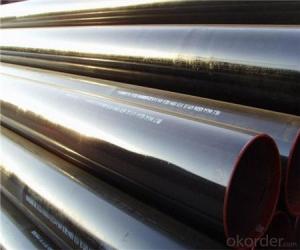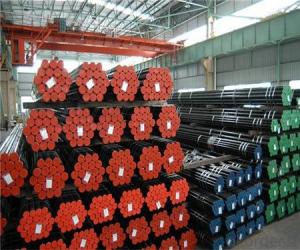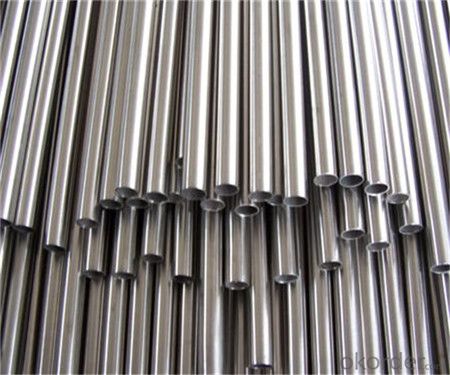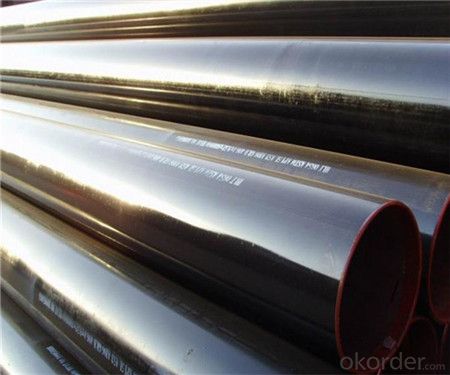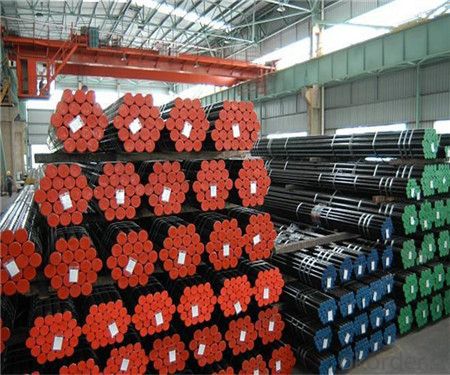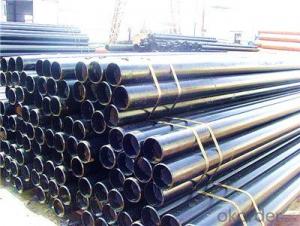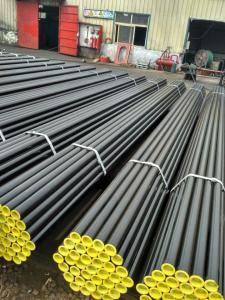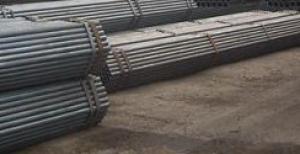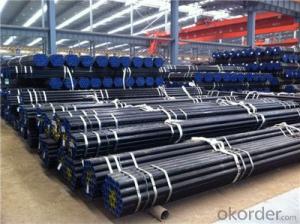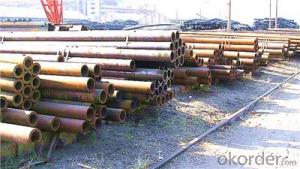Prime Seamless Steel Pipe with best Price
- Loading Port:
- Tianjin
- Payment Terms:
- TT or LC
- Min Order Qty:
- 25 m.t.
- Supply Capability:
- 2000000 m.t./month
OKorder Service Pledge
OKorder Financial Service
You Might Also Like
1、Structure of High Quality Seamless Steel Pipe with Best Price Made in China:
Seamless pipe is formed by drawing a solid billet over a piercing rod to create the hollow shell. As the manufacturing process does not include any welding, seamless pipes are perceived to be stronger and more reliable. Historically seamless pipe was regarded as withstanding pressure better than other types, and was often more easily available than welded pipe.
2、Main Features of High Quality Seamless Steel Pipe with Best Price Made in China:
• High manufacturing accuracy
• High strength
• Small inertia resistance
• Strong heat dissipation ability
• Good visual effect
• Reasonable price
3、High Quality Seamless Steel Pipe with Best Price Made in China Specification:
Standard | GB, DIN, ASTM ASTM A106-2006, ASTM A53-2007 |
Grade | 10#-45#, 16Mn 10#, 20#, 45#, 16Mn |
Thickness | 8 - 33 mm |
Section Shape | Round |
Outer Diameter | 133 - 219 mm |
Place of Origin | Shandong, China (Mainland) |
Secondary Or Not | Non-secondary |
Application | Hydraulic Pipe |
Technique | Cold Drawn |
Certification | API |
Surface Treatment | factory state or painted black |
Special Pipe | API Pipe |
Alloy Or Not | Non-alloy |
Length | 5-12M |
Outer Diameter | 21.3-610mm |
Grade | 20#, 45#, Q345, API J55, API K55, API L80, API N80, API P110, A53B |
Standard | ASME, ASTM |
1) Material:20#(ASTM A 106/A53 GRB.API5LGRB,GB),45#,16Mn,10#.
2) Specification range:OD:21.3-610mm,WT:6-70mm,length:6-12m or according to the requirement of clients.
3) Excutive standards:GB,ASME API5L.ASTM A 106/A53,Despite of the above standards,we can also supply seamless steel pipe with standard of DIN,JIS,and so on,and also develop new products according to the requirements of our clients!
4) Surface:black lacquered,varnish coating or galvanized.
5) Ends:Beveled or square cut,plastic capped,painted.
6) Packing:bundles wrapped with strong steel strip,seaworthy packing.
4、Packaging & Delivery
Packaging Details: | seaworthy package,bundles wrapped with strong steel strip |
Delivery Detail: | 15-30days after received 30%TT |
5、FAQ of High Quality Seamless Steel Pipe with Best Price Made in China:
①How is the quality of your products?
Our products are manufactured strictly according to national and internaional standard, and we take a test
on every pipe before delivered out. If you want see our quality certifications and all kinds of testing report, please just ask us for it.
Guaranteed: If products’ quality don’t accord to discription as we give or the promise before you place order, we promise 100% refund.
②How about price?
Yes, we are factory and be able to give you lowest price below market one, and we have a policy that “ for saving time and absolutely honest business attitude, we quote as lowest as possible for any customer, and discount can be given according to quantity”,if you like bargain and factory price is not low enough as you think, just don’t waste your time.Please trust the quotation we would give you, it is professional one.
③Why should you chose us?
Chose happens because of quality, then price, We can give you both.Additionally, we can also offer professional products inquiry, products knowledge train(for agents), smooth goods delivery, exellent customer solution proposals.Our service formula: good quality+good price+good service=customer’s trust
SGS test is available, customer inspection before shipping is welcome, third party inspection is no problem.
6、High Quality Seamless Steel Pipe with Best Price Made in China Images:
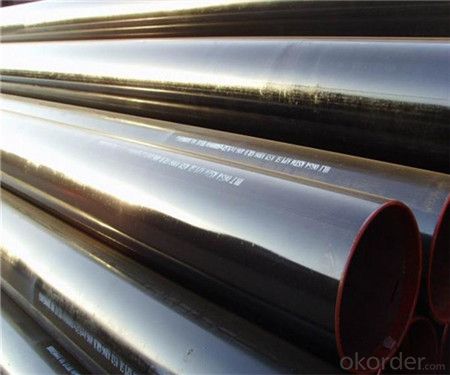
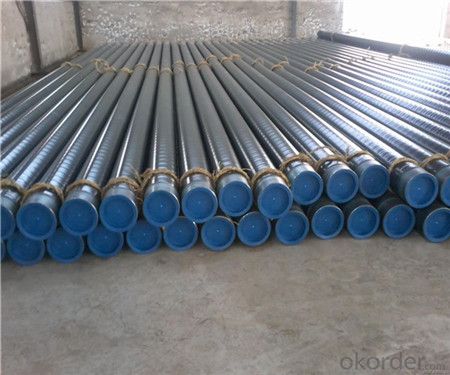
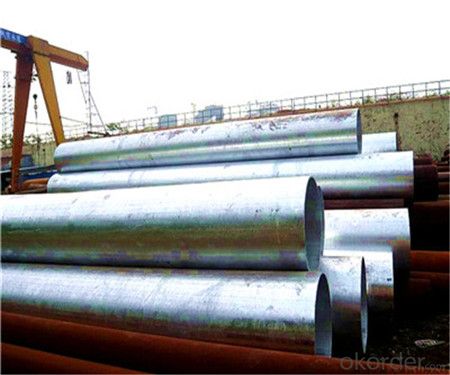
- Q: What is the role of steel pipes in the construction of stadiums?
- Steel pipes play a crucial role in the construction of stadiums as they are used for various purposes such as structural support, drainage systems, and the distribution of utilities like water and electricity. These pipes provide a sturdy and durable framework, allowing for the construction of large and complex structures. They also facilitate efficient and reliable management of essential services, ensuring the smooth operation of stadiums during events.
- Q: How are steel pipes used in the manufacturing of HVAC systems?
- Steel pipes are commonly used in the manufacturing of HVAC systems for various purposes. They are primarily used for transporting fluids such as water, refrigerants, and gases throughout the system. Steel pipes provide durability and strength, ensuring the safe and efficient transfer of these substances. Additionally, steel pipes are often used for structural support, acting as a framework for the HVAC system. Overall, steel pipes play a crucial role in the manufacturing of HVAC systems by facilitating fluid transportation and providing structural stability.
- Q: How are steel pipes used in wastewater treatment?
- Steel pipes are commonly used in wastewater treatment to transport and distribute the wastewater throughout the treatment facility. They are used for various purposes such as carrying raw sewage, transporting treated water, and distributing chemicals for the treatment process. Steel pipes are preferred due to their strength, durability, and resistance to corrosion, making them suitable for handling the harsh and corrosive nature of wastewater.
- Q: What is the minimum wall thickness for steel pipes?
- The minimum wall thickness for steel pipes depends on several factors, including the intended use of the pipe and the specific industry standards and regulations. In general, the minimum wall thickness is determined by considering factors such as the pipe's diameter, the material strength, and the pressure or load it will be subjected to during operation. For example, in the oil and gas industry, the minimum wall thickness for steel pipes is usually specified by industry standards such as API 5L or ASME B31.3. These standards take into account factors such as the pipe's diameter, the material's yield strength, and the maximum pressure it will be exposed to. In other applications, such as structural or mechanical engineering, the minimum wall thickness for steel pipes is determined based on factors such as the pipe's intended load-bearing capacity, the desired safety factor, and any applicable building codes or regulations. It is important to consult the appropriate industry standards, codes, or regulations to determine the specific minimum wall thickness requirements for steel pipes in a given application.
- Q: What connections are there for concrete filled steel tubular column foundations?
- Strengthening ring joint is a more common in the construction of steel pipe concrete column construction, it is to beam column connection through the upper and lower plate reinforcing ring bending force transmission way is through two to strengthen the uniform arrangement between the rings radial ribs and rib structure to connect with the ring the pipe wall at the top of the plate, so as to transfer the shear stress, so as to strengthen the thickness and improve the quality of connection engineering advantage. In the process of engineering construction, according to the construction principle of longitudinal reinforcement of Deng Qiang to control, so that the smaller width of not less than the replacement of the width of the connecting plate 70%, also need to be given due attention in the form of node selection
- Q: Are steel pipes more expensive than other types of pipes?
- Steel pipes can be more expensive than other types of pipes, but this can vary depending on various factors such as the size, grade, and specific application requirements.
- Q: How are steel pipes used in the water supply system?
- Steel pipes are commonly used in the water supply system due to their durability and strength. They are used to transport water from the source, such as a reservoir or water treatment plant, to various distribution points, such as homes, buildings, and industries. Steel pipes are resistant to corrosion and can handle high water pressure, making them ideal for long-distance water transportation. Additionally, steel pipes are often used in underground applications, as they can withstand the weight of soil and other external forces.
- Q: Theoretical weight of 25*25*1.5 square steel tubes
- Square steel tube, referred to as square tube, also known as square tube, is a square pipe of a kind of name, that is, the length of the same steel pipe. The strip is rolled by process. Generally, the strip is disassembled, leveled, crimped and welded to form a round tube. The tube is then rolled into square tubes and cut to the required length, usually 50 pieces per package.
- Q: Can steel pipes be used for firefighting systems?
- Yes, steel pipes can be used for firefighting systems. Steel pipes are commonly used for their durability and resistance to high temperatures, making them suitable for transporting water and other fire suppression agents. They are typically used in larger commercial or industrial buildings where the fire protection system requires a higher flow rate and pressure. Steel pipes also have the advantage of being able to withstand external forces and impacts, ensuring the integrity of the firefighting system. Additionally, steel pipes can be easily connected, making them convenient for installation and maintenance purposes. However, it is important to ensure that the steel pipes used for firefighting systems are properly treated to prevent corrosion and rusting, as this can compromise their effectiveness in an emergency situation. Regular inspections and maintenance should be conducted to ensure the reliability and functionality of the steel pipes within the firefighting system.
- Q: Are steel pipes resistant to earthquakes?
- Steel pipes are generally considered to be more resistant to earthquakes compared to other materials such as concrete or PVC pipes. This is due to the inherent properties of steel, which include its high tensile strength and flexibility. During an earthquake, steel pipes can absorb and distribute the seismic energy more effectively, allowing them to better withstand the shaking and ground movements. Additionally, steel pipes have the ability to deform without rupturing or collapsing, minimizing the risk of structural failure. However, it is important to note that the earthquake resistance of steel pipes ultimately depends on various factors such as the design, installation, and overall structural integrity of the piping system. Proper engineering and construction practices should be followed to ensure the highest level of earthquake resistance for steel pipes.
Send your message to us
Prime Seamless Steel Pipe with best Price
- Loading Port:
- Tianjin
- Payment Terms:
- TT or LC
- Min Order Qty:
- 25 m.t.
- Supply Capability:
- 2000000 m.t./month
OKorder Service Pledge
OKorder Financial Service
Similar products
Hot products
Hot Searches
Related keywords

